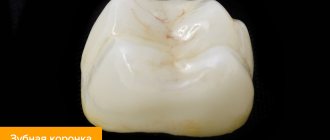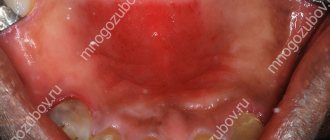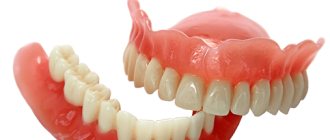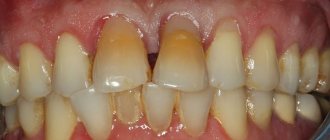Modern solutions offered by clinics allow an individual approach to each patient and selection of the optimal method of restoring teeth in case of their destruction or absence. Prosthetics allows you to restore the aesthetics of the dentition and natural chewing functions, while prolonged absence of teeth always leads to serious health consequences - it affects the bite, jaw joints, and facial appearance. Therefore, it is so important to undergo prosthetics as soon as possible and enjoy the result. But what if instead of “pleasure” you get pain after dental prosthetics?
When is pain after prosthetics normal?
The causes of pain can be different. First of all, we will reassure those who have pain after prosthetics literally on the same day or not the next day that the prosthesis, be it a crown or a bridge, was installed. In 99.9% of cases, this is a normal situation that does not promise anything bad. The anesthesia (if it was used) has stopped working, you are gradually getting used to the new prosthesis, adaptation is required. Discomfort and even a semblance of pain in such conditions is normal. But you still need to carefully monitor your feelings – and consult a specialist if:
- The pain does not go away within 7-10 days
- The pain effect increases
- The pain changes character - from aching it turns into throbbing, it occurs under certain conditions, for example, as a reaction to hot food, or worsens at night when a person takes a horizontal position.
Complications in the postoperative period
The consequences of dental implantation are observed in almost all patients. This is the result of inevitable tissue damage and the introduction of a foreign body into them. Based on the brightness of the reactions, one can judge the implantation of the implants or the development of complications.
| Symptom | Norm | Complication |
| Jaw pain | Appear after the anesthesia wears off. Gradually weaken, disappear within a week | Intensifies every day and is not relieved by analgesics |
| Bleeding | Moderate bleeding 2-3 hours after the intervention | Heavy bleeding longer than 3 hours after surgery or several days later |
| Edema | Appear on day 2-3, swelling is moderate, painless, goes away within a week | The face or cheek becomes very swollen, the swelling increases, and acute pain occurs when pressed. |
| Temperature increase | The temperature goes away in 2 days, the readings are not higher than 38, the general condition is normal | Indicators above 38, lasts longer than 3 days, additional weakness, drowsiness, loss of appetite |
| Difficulty opening your mouth | Caused by swelling and goes away in 2-3 days | Longer than a week, pain and bleeding occurs |
| Hemorrhages and hematomas | Minimum | Extensive, painful |
| Loss of sensation | Goes away soon after installation and activation of chewing load | Lasts longer than a month |
| Seam divergence | Scanty discharge | Bleeding |
Causes of tooth pain under a crown or denture
- If you have not had root canal treatment to remove the pulp before getting a crown, pressure on the damaged nerve may cause pain.
- Patients with malocclusion and bruxism may experience pain at night from pressing on ridges or areas of the tooth that are higher than normal.
- If the denture has shifted, exposing part of the tooth, or, worse, is pressing on the dental nerve, then the slightest pressure or change in temperature can send strong pain signals.
- Teeth under a crown are also at risk for all the problems associated with regular teeth, meaning they can become infected, break, and become vulnerable if the enamel wears down. And this can cause pain.
During operation
Late complications occur 6 months or more after implantation. Causes:
- violation by the patient of the rules of oral care;
- exacerbation of chronic diseases;
- errors by the implantologist in selecting the implantation protocol, violation of prosthetic technique;
- installation of low-quality implants;
- hormonal changes in women in the first six months after installation of implants (menopause, pregnancy).
The most common complications:
- Mucositis - manifests itself as redness, cyanosis or bleeding of the gums in the area where the intraosseous element is installed.
- Peri-implantitis is characterized by inflammation along the border between the implant and bone tissue, resorption (destruction) of the latter.
- Sinusitis - may be of rhinogenic origin, then the area of the artificial root becomes a secondary focus of infection.
- Inflammation of the maxillary sinus can develop against the background of peri-implantitis.
- Damage to the orthopedic structure - when chewing, loads regularly occur on the dentures and the implants themselves.
Similar articles:
- Guarantees of our Center
- Reasons for rejection
- Engraftment of implants
What to do if a tooth hurts under a denture?
If toothache occurs after dentures, the first priority is to identify the cause as soon as possible and apply appropriate therapeutic measures. This problem will not resolve on its own, and any home remedies will not be effective. Therefore, do not wait and contact your dentist for professional help.
If the dentist discovers a tooth infection under the crown, he or she may recommend root canal treatment, which usually requires removal of the denture. In some cases, a hole can be drilled into the crown, allowing the dentist to access the root canal without having to remove and install another crown. This is a complex operation, but it will save you money since the removed crowns are often no longer reusable.
Consequences during the period of osseointegration
When implants take 2-4 months to heal, complications sometimes arise in the form of:
- peri-implantitis - inflammation of soft tissues in the surrounding area, which leads to the destruction of bone tissue, accompanied by pain and suppuration;
- implant rejection - consequences of peri-implantitis, inflammation and necrosis of bone tissue extends beyond the area where the titanium root is installed.
Cause of complications:
- violation of the rules of oral hygiene by the patient, smoking;
- body condition - weakness of bone tissue, severe chronic diseases;
- Violation of implant installation technique is very rare in practice.
Prevention of pain after dental prosthetics
As with all dental procedures, the simplest and cheapest solution is to prevent the problem from occurring in the first place.
- If you have dental crowns or bridges, you should have a dental checkup at least once every 6 months. The dentist will monitor the condition of the teeth under the dentures, since they are initially at risk.
- Hardware cleaning of bacterial plaque and possible food debris will prevent the development of infections and caries; this procedure is mandatory along with normal home oral hygiene, including brushing teeth and using dental floss.
- It is also important to monitor the integrity of the dentures - avoid hard foods and excessive loads so that the denture is not damaged or its tight fit to the stump of the supporting tooth is broken.
Don’t endure pain after dentures - contact the orthopedists at the ILATAN family dentistry closest to your home to get advice and help. Registration is available by phone +7 (495) 748-50-50.
How to identify complications after installation of a prosthesis?
If there are doubts about the normal state of the mucous membrane under the prosthesis, you need to pay attention to several specific manifestations.
Swelling of the gums is a sure sign of the onset of the inflammatory process. The accumulation of purulent exudate under the gum can lead to serious consequences, and in this case you need to contact a dental surgeon. Swelling or gumboil can cause not only pain, but also tooth mobility, and this will lead to the need to replace the denture.
Fistula - acute inflammation of periodontal tissues can result in gumboil. And if the acute period of the complication went unnoticed, then the appearance of a fistula cannot be missed. If the fistula closes, acute inflammation begins again.
Cyst - if adequate treatment of chronic periodontitis was not carried out before prosthetics, it will end with a cyst. The cyst contains pus and appears on an x-ray as a black spot. The symptoms of a cyst are similar to periodontitis - pain when biting, swelling in the area of the causative tooth.
How to prevent or relieve gum disease
After installation of dentures, both fixed and removable, discomfort may occur in the mouth. The reason is that the gums are not yet accustomed to the structures, and because of this, redness and swelling occur.
It is important to prevent the inflammatory process, and this can be done with the help of medications or folk remedies:
- Camomile tea. To prepare, take 1 tbsp. spoon of dried herb, pour boiling water and leave for 10-20 minutes. Rinse your mouth with the cooled infusion every 3 hours.
- Sage. Prepare the infusion in the same way or following the instructions on the package. It has an antimicrobial effect, therefore relieves inflammation and is safe for dentures.
- Oak bark decoction. Improves the condition of the gums in general, strengthening them and relieving inflammation.
- Salt + soda + water. A teaspoon of salt and soda per glass. This solution anesthetizes and disinfects.
- "Rotokan" is an inexpensive liquid herbal extract, sold in pharmacies. Dilute with water in the proportion specified in the instructions and rinse your mouth after each meal.
Medicinal herbs and antiseptic drugs prevent inflammation, relieve pain, stop bleeding, and avoid tissue infection as a result of rubbing with dentures. However, if there is bleeding and inflammation due to dentures, it is best to use proven products such as ASEPTA® Parodontal products.
Complications of dentures. Galvanic syndrome.
The physical concept of galvanism can also occur in the oral cavity in the form of the syndrome of the same name. This is the formation of a galvanic electric current in the oral cavity in the presence of dissimilar metals in the patient’s mouth, with correspondingly different potentials. In this case, all the conditions necessary for the formation of galvanic current arise. In such situations, saliva performs the function of an electrolyte.
Clinical manifestations are as follows:
- The appearance of a metallic taste in the mouth;
- Darkening of metal parts of prostheses;
- Headache;
- Allergic reactions.
This situation can be resolved by replacing dentures .
Reasons for the development of complications
- low qualifications of the doctor who incorrectly selects the size of the implant and its location, does not pay much attention to sterility,
- treatment of oral diseases was not carried out, plaque was not removed from remaining teeth,
- the presence of diseases that can lead to implant rejection - at the preparation stage the doctor did not conduct a thorough medical history or the patient hid the presence of body problems,
- exacerbation of a chronic disease,
- injuries of the jaw system,
- smoking and alcohol abuse,
- Poor patient compliance with the implantologist’s recommendations at all stages of treatment, especially ignoring the rules of caring for teeth and gums.
Serious complications that lead to removal of implants are quite rare today. And in order to prevent their occurrence, it is necessary to choose professional and experienced doctors, a reliable clinic and high-quality brands of implants. Patients are also strongly advised to follow the recommendations of the attending physician and in no case ignore the rules of hygienic care.
Is it possible to re-implant teeth?
Complications that led to rejection and subsequent removal of implants are characterized by acute inflammation and shrinkage of bone tissue. Therefore, re-implantation is not always possible. Firstly, a certain time must pass for the rehabilitation of tissues and the entire body. Secondly, re-implantation with delayed loading will require bone grafting - in 99% of cases it will not be enough to re-install the implant.
Another option is to use immediate loading implantation techniques. They do not require bone grafting when installing 3 or more implants, but when performing single restorations, bone grafting may still be required.
As an alternative, removable dentures may be considered after removal of a failed implant. Modern butterfly dentures (immediate dentures) are quite comfortable, they are created in just a few days and can quite effectively solve the problem of missing teeth for some time.
In general, the issue of re-implantation is decided individually for each patient. But the chance remains quite high, especially with promptly taken measures.
1 Perova M.D. Complications of dental implantation, their treatment and prevention. New in dentistry. 2002. 2 F.Renoir., B.Rangert. Risk factors in dental implantology. M., 2004.
Preventive examination
Every six months you need to visit your orthopedic dentist for a preventive examination. The doctor will check the condition of the structures, assess the level of hygiene, and may refer you for treatment of other teeth or replace existing dental defects. The dentist can advise on the possibility of a whitening procedure, taking into account the characteristics of the prosthetics performed.
Date of publication: September 20, 2020 Last update: September 22, 2022 © 2020 Professorial Dentistry “22 Century”. All rights reserved.
Types of complications of dental prosthetics
Prosthetic stomatitis
The most common complications of dentures are:
- Cementation of fixed structures after their fixation;
- Allergic reactions to materials used during prosthetics - most often residual monomer in the base of a removable denture;
- Denture stomatitis is a various pathology of the oral mucosa of an inflammatory nature, caused by the presence of a denture in the oral cavity;
- Caries and its complications under structures;
- Galvanic syndrome is a pathological condition, the appearance of which is caused by the effect of galvanic currents on the tissues of the oral cavity;
- Discomfort caused by the installation of prostheses - rubbing, formation of bedsores under the prosthetic bed.










